卡尔顿大学硕士课程专业
全面解读卡尔顿学院
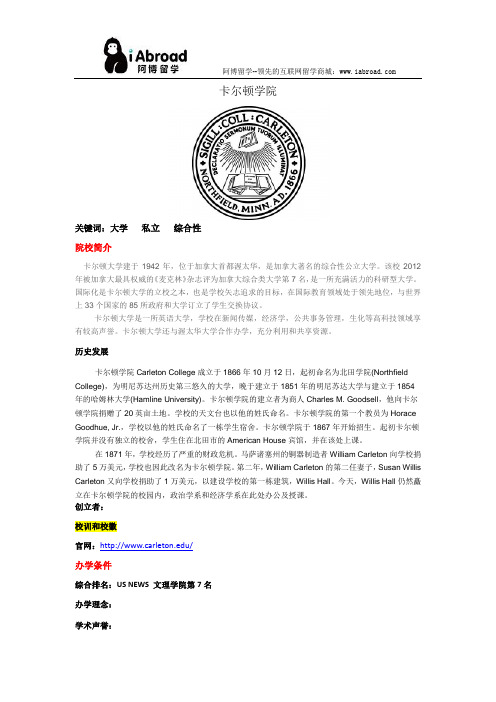
卡尔顿学院关键词:大学私立综合性院校简介卡尔顿大学建于1942年,位于加拿大首都渥太华,是加拿大著名的综合性公立大学。
该校2012年被加拿大最具权威的《麦克林》杂志评为加拿大综合类大学第7名,是一所充满活力的科研型大学。
国际化是卡尔顿大学的立校之本,也是学校矢志追求的目标,在国际教育领域处于领先地位,与世界上33个国家的85所政府和大学订立了学生交换协议。
卡尔顿大学是一所英语大学,学校在新闻传媒,经济学,公共事务管理,生化等高科技领域享有较高声誉。
卡尔顿大学还与渥太华大学合作办学,充分利用和共享资源。
历史发展卡尔顿学院Carleton College成立于1866年10月12日,起初命名为北田学院(Northfield College),为明尼苏达州历史第三悠久的大学,晚于建立于1851年的明尼苏达大学与建立于1854年的哈姆林大学(Hamline University)。
卡尔顿学院的建立者为商人Charles M. Goodsell,他向卡尔顿学院捐赠了20英亩土地。
学校的天文台也以他的姓氏命名。
卡尔顿学院的第一个教员为Horace Goodhue, Jr.,学校以他的姓氏命名了一栋学生宿舍。
卡尔顿学院于1867年开始招生。
起初卡尔顿学院并没有独立的校舍,学生住在北田市的American House宾馆,并在该处上课。
在1871年,学校经历了严重的财政危机。
马萨诸塞州的铜器制造者William Carleton向学校捐助了5万美元,学校也因此改名为卡尔顿学院。
第二年,William Carleton的第二任妻子,Susan Willis Carleton又向学校捐助了1万美元,以建设学校的第一栋建筑,Willis Hall。
今天,Willis Hall仍然矗立在卡尔顿学院的校园内,政治学系和经济学系在此处办公及授课。
创立者:校训和校徽官网:/办学条件综合排名:US NEWS 文理学院第7名办学理念:学术声誉:卡尔顿学院致力于提供真正的文科教育及充满挑战性的课程,以拓宽学生的学习领域及令其更深入的思考问题。
卡尔顿学院有什么强势专业

卡尔顿学院有什么强势专业卡尔顿学院强势专业主要有这些:生物学、化学、心理学、历史学、视觉和表演艺术,其中理科专业最热门的就是化学、生物等等专业,今天店铺小编就给大家介绍卡尔顿学院有什么强势专业,如果对这个话题感兴趣的话,欢迎点击。
卡尔顿学院强势专业卡尔顿学院提供33个专业和37个辅修,涉及艺术、人文、自然科学、数学和社会科学。
在校期间,学生需选择至少一种主修专业(major)作为自己的主修方向。
一般来讲,完成每种主修专业需上满该专业内的至少12门课;而完成辅修(minor)需上满至少8门课。
学生亦可根据自己的兴趣及导师的建议,设计独立专业。
卡尔顿学院是较为少见的文理十分均衡的文理学院。
学校的强势学科很多,包括:生物学、化学、计算机科学、地质学、经济学、心理学、历史学、视觉和表演艺术。
理科方面最突出的是化学、生物(Pre-med非常强)和地质学。
其中Carleton的化学系具有着文理学院里第一档次的实力。
不过除了以上专业,近年来,大学的计算机科学专业也正成为一颗新兴之星,是大学里最热门专业的专业之一。
说完理科,自然还少不了Carleton的传统强势学科——社会科学了。
在所有社科里,卡尔顿学院的政治学/国际关系是传统的强势科目,并且非常热门。
它的政治学/国际关系从上世纪中期开始便保持着很强的实力(诺贝尔奖得主Anthony Dawns便毕业于Carleton政治系),校内的很多教授都是领域内非常有地位的专家。
店铺需要具备哪些条件1.自费留学不受学历、年龄的限制,凡具备条件者,均可申请自费到国外上大学(专科、本科)、读研究生或进修。
2.中学毕业生、自费大学生申请自费店铺,可持有关证明材料直接到户籍所在地公安机关办理自费店铺手续。
3.大专以上的公费在校生及毕业生(具有大专以上学历),在国内服务一定年限或偿还高等教育赔偿费后均可申请自费店铺。
(服务年限:本科毕业生为五年,研究生毕业为三年,专科及成人高校毕业生为二年;偿还培养费:专科生每学年1,500元,本科生每学年2,500元,硕士研究生每学年4,000元,博士生每学年6000元。
加拿大留学本硕连读专业的汇总介绍
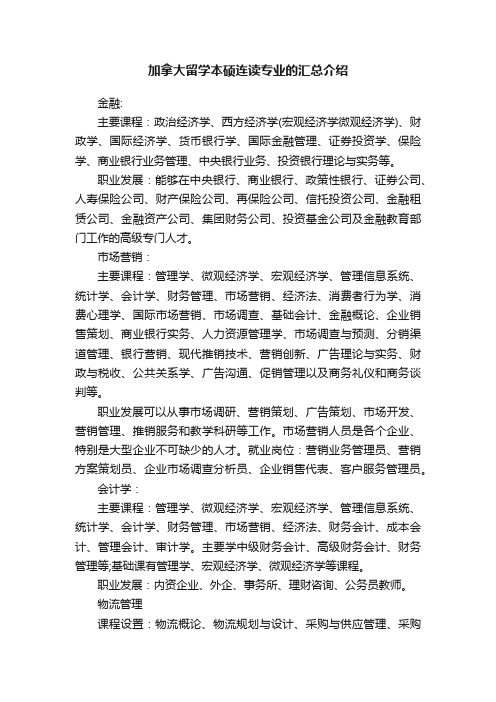
加拿大留学本硕连读专业的汇总介绍金融:主要课程:政治经济学、西方经济学(宏观经济学微观经济学)、财政学、国际经济学、货币银行学、国际金融管理、证券投资学、保险学、商业银行业务管理、中央银行业务、投资银行理论与实务等。
职业发展:能够在中央银行、商业银行、政策性银行、证券公司、人寿保险公司、财产保险公司、再保险公司、信托投资公司、金融租赁公司、金融资产公司、集团财务公司、投资基金公司及金融教育部门工作的高级专门人才。
市场营销:主要课程:管理学、微观经济学、宏观经济学、管理信息系统、统计学、会计学、财务管理、市场营销、经济法、消费者行为学、消费心理学、国际市场营销、市场调查、基础会计、金融概论、企业销售策划、商业银行实务、人力资源管理学、市场调查与预测、分销渠道管理、银行营销、现代推销技术、营销创新、广告理论与实务、财政与税收、公共关系学、广告沟通、促销管理以及商务礼仪和商务谈判等。
职业发展可以从事市场调研、营销策划、广告策划、市场开发、营销管理、推销服务和教学科研等工作。
市场营销人员是各个企业、特别是大型企业不可缺少的人才。
就业岗位:营销业务管理员、营销方案策划员、企业市场调查分析员、企业销售代表、客户服务管理员。
会计学:主要课程:管理学、微观经济学、宏观经济学、管理信息系统、统计学、会计学、财务管理、市场营销、经济法、财务会计、成本会计、管理会计、审计学。
主要学中级财务会计、高级财务会计、财务管理等;基础课有管理学、宏观经济学、微观经济学等课程。
职业发展:内资企业、外企、事务所、理财咨询、公务员教师。
物流管理课程设置:物流概论、物流规划与设计、采购与供应管理、采购项目管理、运输管理、仓储管理、配送管理、国际物流学、国际贸易理论与实务、采购过程演练、运输实务、仓储管理实务、物流配送中心设计、国际物流实务、成功学、创新学、素质拓展训练等。
职业发展:作为物流管理专业的毕业生可在物流企业、港口、海关、货运公司、商贸企业等就业,就业前景良好。
卡尔顿大学要求

卡尔顿大学要求卡尔顿大学建于1942年成立,是由安大略湖省的基督教青年会发起建立的,1957年正式成为大学,是加拿大著名的公立大学。
卡尔顿大学位于加拿大首都渥太华市中心,校园占地62公顷,风景秀丽,毗邻政府机构,实验室,图书馆,学习氛围浓郁。
它在公共事务与管理、高科技等领域中名列前茅,享有盛誉。
学校是安大略湖大学联盟的成员,还是加拿大大学及学院委员会的成员,也是国际大学联合会的成员。
学年安排据360教育集团介绍,秋季学期9月-12月,冬季学期1月-4月,夏季学期5月-8月(每年9月为开学日期)。
入学时间1,5,7,9月,但只有冬季与秋季开设所有课程。
入学要求入学的基本条件:1)国内高中以上学历,并且平均成绩在80分以上(申请文科需达67%-80%,理科70%-75%,商科74%-80%,工程70%-85%)2)*老托福即Paper-basedTOEFL(PBT)580分(机考237分以上)*新托福Internet-basedTOEFL(IBT)86分(且写作,口语单项至少22;阅读,听力至少20)*IELTS6.5分上,且听,说,读,写各不能低于6.0附:对于不符合以上入学条件的申请人,学校将会由大学应用语言学院对于申请人进行评估,并且根据申请人所在学校老师所写的推荐信中对于学生评价的内容而做出最后的评定。
开学日期本科开学时间:每年1月、5月、7月、9月,但只有冬季与秋季开设所有课程。
申请截至日:每年4月1日、10月15日研究生开学时间:每年1月、5月、7月、9月,但只有冬季与秋季开设所有课程。
申请截至日:每年11月1日、8月31日[3]学习费用本科学位课程:约10000加元/年硕士学位课程:约10000加元/年5537-5865加元/年(校内宿舍);7800加元/年(校外公寓)保险费用:703加元截止目前,留学360更新海外名校录取86789枚,中哈佛大学43人、耶鲁大学56人、斯坦福大学43人、麻省理工学院25人、牛津大学38人、剑桥大学35人、多伦多大学 290人、麦吉尔大学353人、悉尼大学1874人、墨尔本大学1286人、澳洲国立大学 1100人、香港大学120人、新加坡国立大学150人、南洋理工大学227人、新西兰奥克兰大学1241人。
加拿大卡尔顿大学本科专业有哪些
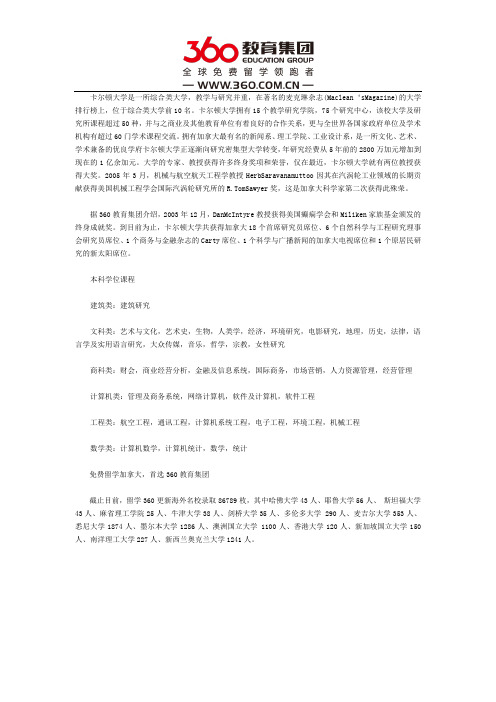
卡尔顿大学是一所综合类大学,教学与研究并重,在著名的麦克琳杂志(Maclean‘sMagazine)的大学排行榜上,位于综合类大学前10名。
卡尔顿大学拥有15个教学研究学院,75个研究中心,该校大学及研究所课程超过50种,并与之商业及其他教育单位有着良好的合作关系,更与全世界各国家政府单位及学术机构有超过60门学术课程交流。
拥有加拿大最有名的新闻系、理工学院、工业设计系,是一所文化、艺术、学术兼备的优良学府卡尔顿大学正逐渐向研究密集型大学转变,年研究经费从5年前的2800万加元增加到现在的1亿余加元。
大学的专家、教授获得许多终身奖项和荣誉,仅在最近,卡尔顿大学就有两位教授获得大奖。
2005年3月,机械与航空航天工程学教授HerbSaravanamuttoo因其在汽涡轮工业领域的长期贡献获得美国机械工程学会国际汽涡轮研究所的R.TomSawyer奖,这是加拿大科学家第二次获得此殊荣。
据360教育集团介绍,2003年12月,DanMcIntyre教授获得美国癫痫学会和Miliken家族基金颁发的终身成就奖。
到目前为止,卡尔顿大学共获得加拿大18个首席研究员席位、6个自然科学与工程研究理事会研究员席位、1个商务与金融杂志的Carty席位、1个科学与广播新闻的加拿大电视席位和1个原居民研究的新太阳席位。
本科学位课程建筑类:建筑研究文科类:艺术与文化,艺术史,生物,人类学,经济,环境研究,电影研究,地理,历史,法律,语言学及实用语言研究,大众传媒,音乐,哲学,宗教,女性研究商科类:财会,商业经营分析,金融及信息系统,国际商务,市场营销,人力资源管理,经营管理计算机类:管理及商务系统,网络计算机,软件及计算机,软件工程工程类:航空工程,通讯工程,计算机系统工程,电子工程,环境工程,机械工程数学类:计算机数学,计算机统计,数学,统计免费留学加拿大,首选360教育集团截止目前,留学360更新海外名校录取86789枚,其中哈佛大学43人、耶鲁大学56人、斯坦福大学43人、麻省理工学院25人、牛津大学38人、剑桥大学35人、多伦多大学 290人、麦吉尔大学353人、悉尼大学1874人、墨尔本大学1286人、澳洲国立大学 1100人、香港大学120人、新加坡国立大学150人、南洋理工大学227人、新西兰奥克兰大学1241人。
加拿大会计专业硕士留学 卡尔顿大学会计硕士专业介绍.doc
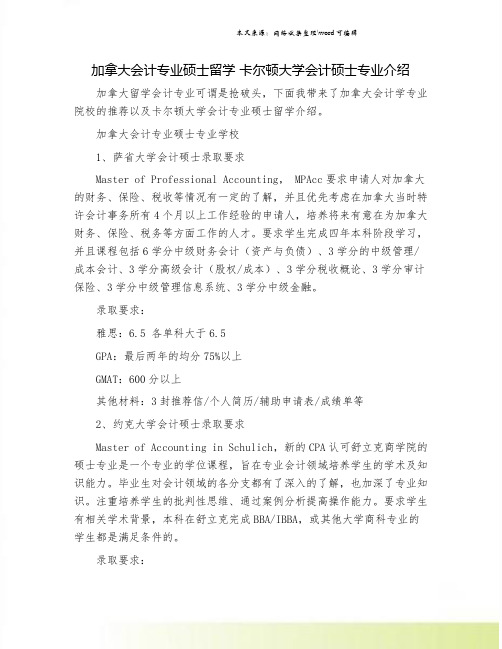
加拿大会计专业硕士留学卡尔顿大学会计硕士专业介绍加拿大留学会计专业可谓是抢破头,下面我带来了加拿大会计学专业院校的推荐以及卡尔顿大学会计专业硕士留学介绍。
加拿大会计专业硕士专业学校1、萨省大学会计硕士录取要求Master of Professional Accounting, MPAcc要求申请人对加拿大的财务、保险、税收等情况有一定的了解,并且优先考虑在加拿大当时特许会计事务所有4个月以上工作经验的申请人,培养将来有意在为加拿大财务、保险、税务等方面工作的人才。
要求学生完成四年本科阶段学习,并且课程包括6学分中级财务会计(资产与负债)、3学分的中级管理/成本会计、3学分高级会计(股权/成本)、3学分税收概论、3学分审计保险、3学分中级管理信息系统、3学分中级金融。
录取要求:雅思:6.5 各单科大于6.5GPA:最后两年的均分75%以上GMAT:600分以上其他材料:3封推荐信/个人简历/辅助申请表/成绩单等2、约克大学会计硕士录取要求Master of Accounting in Schulich,新的CPA认可舒立克商学院的硕士专业是一个专业的学位课程,旨在专业会计领域培养学生的学术及知识能力。
毕业生对会计领域的各分支都有了深入的了解,也加深了专业知识。
注重培养学生的批判性思维、通过案例分析提高操作能力。
要求学生有相关学术背景,本科在舒立克完成BBA/IBBA,或其他大学商科专业的学生都是满足条件的。
录取要求:雅思:7.5GPA:80%GMAT:550-790其他材料:2封推荐信(至少一封学术的)/个人陈述/个人简历/实习/成绩单等3、卡尔顿大学会计硕士录取要求Master of Accounting,卡尔顿大学的会计硕士是新开的,要求学生本科阶段学习基础财务会计、基础管理会计、微观经济学、宏观经济学、统计学、中级财务会计I&II、审计与担保、个人及公司税收、中级管理会计、高级管理会计、公司战略治理、商法、信息系统等。
中外合作办学教育硕士

中外合作办学教育硕士中外合作办学教育硕士是指由国内高校与国外高校合作共同开设的教育硕士专业课程。
这种合作办学模式旨在借助国外高校的优秀教育资源和管理经验,培养具有国际化视野和高端管理能力的人才,以满足国内高等教育的迫切需求。
随着我国经济的发展和人口的日益增长,加快高素质人才的培养已成为当前高等教育发展的关键问题。
而与国外高校开展合作办学教育硕士是一种有效的途径,能够使国内高校直接融入国际化教育体系,并提升自身的办学水平和教育质量。
太原理工大学与美国伊利诺伊州立大学、加拿大卡尔顿大学等国外高校合作,共同开设中外合作办学教育硕士专业。
该专业课程采取双导师制,将国内外高校的优秀师资力量充分整合,采用全英文教学,课程设置涵盖了现代企业管理、大数据分析、国际贸易等多个领域,旨在为学生提供广阔的国际视野和创新思维能力,培养具有全球化才能的国际商务高端人才。
中外合作办学教育硕士的开展对于提高国内高等教育的国际竞争力和境外高层次人才的引进和培养起到了积极的促进作用。
在合作办学过程中,国内高校可以借鉴国外高校的先进管理经验和教育理念,提高教学质量和学生培养质量;国外高校可以进一步深入了解中国市场和文化,拓展国际教育市场。
同时,学生也可以通过该专业的学习获得更广的职业发展机会和更高的职业收入。
然而,中外合作办学教育硕士也面临一些困难和挑战。
首先,由于中外高校的制度和文化差异,难免会出现教学内容和教学方法上的不同,这可能会影响学生的学习效果和教学质量。
其次,由于学生分居两地,要求学校之间的沟通和协调达到最佳效果,同时还要加强对学生的管理和教学监督,保证教学质量的可控性和可评估性。
卡尔顿大学经济学
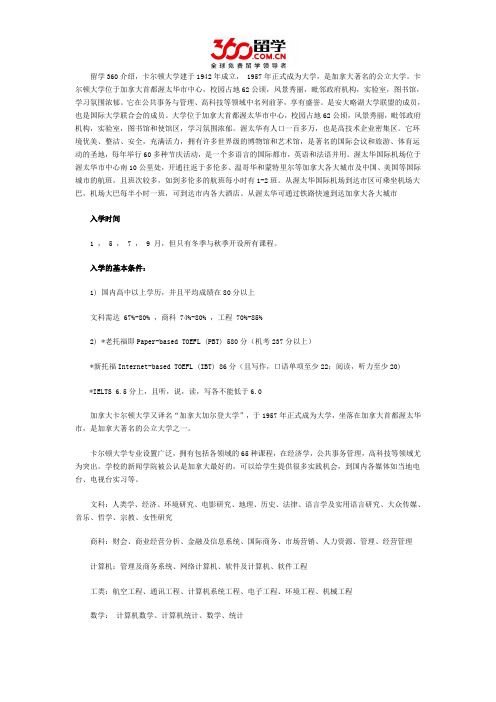
留学360介绍,卡尔顿大学建于1942年成立, 1957年正式成为大学,是加拿大著名的公立大学。
卡尔顿大学位于加拿大首都渥太华市中心,校园占地62公顷,风景秀丽,毗邻政府机构,实验室,图书馆,学习氛围浓郁。
它在公共事务与管理、高科技等领域中名列前茅,享有盛誉。
是安大略湖大学联盟的成员,也是国际大学联合会的成员。
大学位于加拿大首都渥太华市中心,校园占地62公顷,风景秀丽,毗邻政府机构,实验室,图书馆和使馆区,学习氛围浓郁。
渥太华有人口一百多万,也是高技术企业密集区。
它环境优美、整洁、安全,充满活力,拥有许多世界级的博物馆和艺术馆,是著名的国际会议和旅游、体育运动的圣地,每年举行60多种节庆活动,是一个多语言的国际都市,英语和法语并用。
渥太华国际机场位于渥太华市中心南10公里处,开通往返于多伦多、温哥华和蒙特里尔等加拿大各大城市及中国、美国等国际城市的航班,且班次较多,如到多伦多的航班每小时有1-2班。
从渥太华国际机场到达市区可乘坐机场大巴,机场大巴每半小时一班,可到达市内各大酒店。
从渥太华可通过铁路快速到达加拿大各大城市入学时间1 , 5 , 7 , 9 月,但只有冬季与秋季开设所有课程。
入学的基本条件:1) 国内高中以上学历,并且平均成绩在80分以上文科需达 67%-80% ,商科 74%-80% ,工程 70%-85%2) *老托福即Paper-based TOEFL (PBT) 580分(机考237分以上)*新托福Internet-based TOEFL (IBT) 86分(且写作,口语单项至少22;阅读,听力至少20)*IELTS 6.5分上,且听,说,读,写各不能低于6.0加拿大卡尔顿大学又译名“加拿大加尔登大学”,于1957年正式成为大学,坐落在加拿大首都渥太华市,是加拿大著名的公立大学之一。
卡尔顿大学专业设置广泛,拥有包括各领域的65种课程,在经济学,公共事务管理,高科技等领域尤为突出。
2018加拿大卡尔顿大学设计硕士专业申请指南

2018加拿大卡尔顿大学设计硕士专业申请指南
加拿大卡尔顿大学一直是留学生青睐的大学,那么该学校的设计硕士专业申请要求有哪些呢?这是不少出国人士感兴趣的话题,和一起来了解由小编整理的2018加拿大卡尔顿大学设计硕士专业申请要求,欢迎阅读。
2018加拿大卡尔顿大学设计硕士专业申请指南
该项目提供基于项目的跨学科工作室活动、基于讲座的方法和理论课,以及个人或团队论文、研讨会和国际会议以及讲习班参与。
01、成绩单
申请者必须持有设计学科学士学位,或同等学历,至少具有学士学位。
02、作品集
作品集是创造性的智力活动和最近的专业工作的最好例子,表明申请人有充分的准备去从事该项目的研究。
这些活动可由提案、报告或分析文件来表示。
重点应放在以视觉形式理解设计思想交流的证据上。
档案袋的撰写应具有专业性,便于内容的评审,并应按规定格式提交。
03、简历
所有学术和专业成就的详细概述。
04、推荐信
来自个人学习的证明或者工作方面的证明。
05、意向声明
预期研究领域的简要概述及其与项目的一致性。
06、补充表格
在研究生入学申请时候列出的额外的表格。
在卡尔顿大学攻读研究生英语是必要的。
所有申请人均须符合语言要求。
卡尔顿大学mba
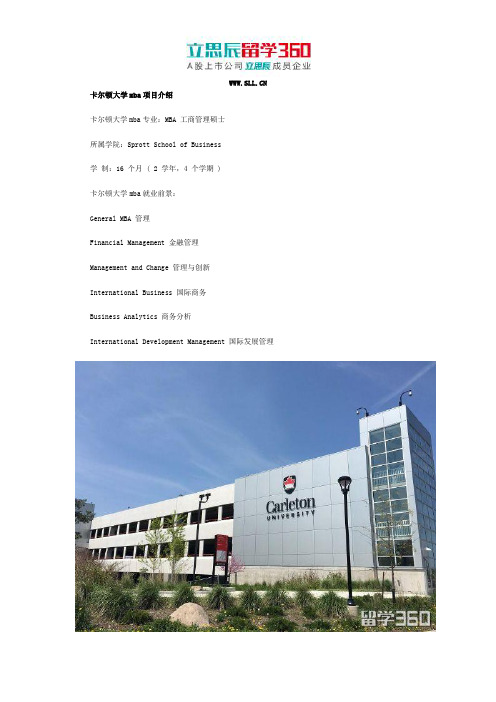
卡尔顿大学mba项目介绍
卡尔顿大学mba专业:MBA 工商管理硕士
所属学院:Sprott School of Business
学制:16 个月 ( 2 学年,4 个学期 )
卡尔顿大学mba就业前景:
General MBA 管理
Financial Management 金融管理
Management and Change 管理与创新
International Business 国际商务
Business Analytics 商务分析
International Development Management 国际发展管理
卡尔顿大学mba申请要求:
四年本科学士学位,GPA 要求为 B
不限本科专业背景,有工作经验者优先录取
要求 GMAT 550
直录语言:托福 86,雅思 6.5
需要参加学校的视频面试
卡尔顿大学mba项目特色
精心打造的国际合作高端MBA项目;教育部和国务院学位办权威认证!面向企业管理人员,实现职业发展的梦想舞台!
小班化授课,一个与全球商界精英交流互动的高端平台!
在职学习24个月,核心内容“企业创新与变革管理”!
全英文授课,采用国际原版教材和世界著名顶级商学院的案例!
有机会游学加拿大,亲身体验北美独特文化氛围!
不参加全国MBA联考,自主招生,注重学生综合素质评估!
相关推荐:
卡尔顿大学排名
加拿大卡尔顿大学
卡尔顿大学双录。
卡尔顿 SYSC 专业参考

Systems and Computer Engineering (SYSC)Systems and Computer Engineering (SYSC) CoursesSystems and Computer Eng.Faculty of Engineering & DesignNote: the Departments of Systems and Computer Engineering and Electronics offer courses in: Biomedical and Electrical Engineering, Communications Engineering, Computer Systems Engineering, Electrical Engineering, Software Engineering and Engineering Physics.SYSC 1005 [0.5 credit]Introduction to Software DevelopmentA first course in software development as an engineering discipline, using a modern programming language, Language syntax. Algorithm design. Tracing and visualizing program execution. Testing and debugging. Program style, documentation, reliability. Lab projects are drawn from a variety of application domains, for example, digital image manipulation; computer games; and robotics. Precludes additional credit for ECOR 1606 and SYSC 1101.Lectures two hours a week, tutorial one hour a week, laboratory three hours a week.SYSC 2001 [0.5 credit]Computer Systems FoundationsComputer architecture and organization: CPU, cache, memory, input/output, bus structures, interrupts; computer arithmetic: integer and floating point; CPU: instruction sets, addressing modes, instruction encoding. Input/output: programmed, interrupt-driven, block-oriented. Examples from several modern processor families.Prerequisite(s): ECOR 1606 or SYSC 1102 or SYSC 1005. Additional recommended background: SYSC 2006. Lectures three hours a week, laboratory two hours a week. SYSC 2002 [0.5 credit]Data Structures and AlgorithmsIn-depth experience in the design and constructionof computer programs involving data structures and different programming paradigms. Data structures, formal specification, abstract data types, graphs, recursion, finite state machines and object-oriented programming. Precludes additional credit for SYSC 2100 and SYSC 3002.Prerequisite(s): ECOR 1606.Lectures three hours a week, laboratory two hours a week.SYSC 2003 [0.5 credit]Introductory Real-Time SystemsPrinciples of event-driven systems. Review of computer organization. Assemblers and linkers. Developmentof embedded applications. Programming external interfaces, programmable timer. Input/output methods: polling, interrupts. Real-time issues: concurrency, mutual exclusion, buffering. Introduction to concurrent processes. Precludes additional credit for SYSC 3003 and SYSC 3006.Prerequisite(s): SYSC 2001 and (SYSC 2002 or SYSC 2006).Lectures three hours a week, laboratory two hours a week. SYSC 2004 [0.5 credit]Object-Oriented Software DevelopmentDesigning and implementing small-scale programs as communities of collaborating objects, using a dynamically-typed or statically-typed programming language. Fundamental concepts: classes, objects, encapsulation, information hiding, inheritance, polymorphism. Iterative, incremental development and test-driven development. Precludes additional credit for SYSC 1101.Prerequisite(s): SYSC 2002 or SYSC 2006 or permission of the department.Lectures three hours a week, laboratory two hours a week. SYSC 2006 [0.5 credit]Foundations of Imperative ProgrammingModular programming with a procedural language. Compilation and linking, libraries. Memory management and object lifetimes: static allocation, automatic allocation in stack frames, dynamic allocation from the heap. Introduction to data structures: dynamic arrays, linked lists. Collections: lists, stacks, queues. Introduction to recursion. Precludes additional credit for SYSC 1102 and SYSC 2002.Prerequisite(s): ECOR 1606 or SYSC 1005.Lectures three hours a week, laboratory two hours a week. SYSC 2100 [0.5 credit]Algorithms and Data StructuresThorough coverage of fundamental abstract collections: stacks, queues, lists, priority queues, dictionaries, sets, graphs. Data structures: review of arrays and linked lists; trees, heaps, hash tables. Specification, design, implementation of collections, complexity analysis of operations. Sorting algorithms.Precludes additional credit for SYSC 2002. Prerequisite(s): (SYSC 1102 or SYSC 2006) and (SYSC 1101 or SYSC 2004).Lectures three hours a week, laboratory two hours a week.SYSC 2101 [0.5 credit]Software Development ProjectDevelopment of expertise in designing, implementing, and testing industrial-quality, reusable code through individual and team projects. Applying and extending previously acquired knowledge of patterns, frameworks, UML, iterative and incremental development, Java and C+ + to medium- and large-scale systems.Prerequisite(s): SYSC 2100 or SYSC 2004.Lectures two hours a week, laboratory three hours a week. SYSC 3001 [0.5 credit]Operating Systems & DatabasesOperating systems and databases treated from a common perspective. Management of CPU, processes, memory, files, and data. Implications of concurrency. Concurrent programming, including interprocess communication in distributed systems. Data models and query languages. Precludes additional credit for SYSC 4001. Prerequisite(s): (SYSC 2002 or SYSC 2100), and SYSC 2003.Lectures three hours a week, laboratory/problem analysis two hours a week.SYSC 3006 [0.5 credit]Computer OrganizationComputer organization: processor, memory, input/ output, system bus. Number systems: binary, decimal, hexadecimal. Assembly language programming: representation of data, instruction encoding, execution. Devices: keyboard, programmable timer, parallel interface. Input/output methods: polling, hardware/software interrupts.Precludes additional credit for SYSC 2001 and SYSC 2003. May not be taken for credit by students in Computer Systems Engineering, Communications Engineering, or Software Engineering.Prerequisite(s): (SYSC 2002 or SYSC 2006) and ELEC 2607.Lectures three hours a week, laboratory two hours a week. SYSC 3010 [0.5 credit]Computer Systems Development Project Development of expertise in designing, implementingand testing maintainable, reusable software through team projects. Applying modern programming languages, design patterns, frameworks, UML and modern development processes (refactoring, iterative and incremental development, version control techniques) to medium-scale projects; for example, embedded or mobile applications.Precludes additional credit for SYSC 2101 and SYSC 3110.Prerequisite(s): SYSC 2004 and SYSC 2100, and third-year status in Computer Systems Engineering.Lectures two hours a week, laboratory three hours a week.SYSC 3020 [0.5 credit]Introduction to Software EngineeringIntroduction to software engineering principles,software development life-cycles. Modelling in software engineering. Current techniques, notations, methods, processes and tools used in software engineering. UML modelling. Introduction to software quality, software verification and validation, software testing.Precludes additional credit for SYSC 3120 and SYSC 4120.Prerequisite(s): SYSC 2004 and SYSC 2006.Lectures three hours a week, laboratory three hours alternate weeks.SYSC 3100 [0.5 credit]Systems Analysis and DesignCreating requirements specifications prior to designing and implementing complex software systems. Software development lifecycles, role of requirements analysis; functional decomposition, dataflow modeling; database modeling, entity-relationship diagrams; finite state machines; object-oriented analysis; use cases, use case maps; project management; introduction to software design.Precludes additional credit for BUSI 3402.Prerequisite(s): SYSC 2004 or SYSC 2100.Lectures three hours a week, laboratory/problem analysis two hours a week.SYSC 3101 [0.5 credit]Programming LanguagesPrinciples underlying different kinds of programming languages (procedural, functional, logic programming) and their semantics. Overview of machinery needed for language support (compilers, interpreters and run-time systems).Prerequisite(s): SYSC 2004 or SYSC 2100.Lectures three hours a week, laboratory three hours alternate weeks.SYSC 3110 [0.5 credit]Software Development ProjectDevelopment of expertise in designing, implementingand testing maintainable, reusable software through team projects. Applying modern programming languages, design patterns, frameworks, UML and modern development processes (detection of olfactible source code defects, refactoring, iterative and incremental development, version control techniques) to medium-scale projects.Precludes additional credit for SYSC 2101 and SYSC 3010.Prerequisite(s): SYSC 2004 and SYSC 2100, and third-year status in Software Engineering.Lectures two hours a week, laboratory three hours a week.SYSC 3120 [0.5 credit]Software Requirements EngineeringCurrent techniques, notations, methods, processes and tools used in Requirements Engineering. Requirements elicitation, negotiation, modelling requirements, management, validation. Skills needed for Requirements Engineering and the many disciplines on which it draws. Requirements analysis: domain modelling, modelling object interactions; UML modelling. Introduction to software development processes.Precludes additional credit for SYSC 3020. Prerequisite(s): SYSC 2004 and SYSC 2100 and third-year status in Software Engineering.Lectures three hours a week, laboratory two hours a week. SYSC 3200 [0.5 credit]Industrial EngineeringTechniques of operations research for decision-makingin complex engineering systems. Linear programming, network models, PERT, integer programming, dynamic programming, queuing systems and inventory models. Problem solving is emphasized.Precludes additional credit for BUSI 2300, ECON 4004, or MATH 3801.Prerequisite(s): MATH 1004 and MATH 1104 and (ECOR 1606 or SYSC 1100).Lectures three hours a week, laboratory/problem analysis 1.5 hours per week.SYSC 3303 [0.5 credit]Real-Time Concurrent SystemsPrinciples and practice of a systems engineering approach to the development of software for real-time, concurrent, distributed systems. Designing to achieve concurrency, performance, and robustness, using visual notations. Converting designs into programs. Introduction to hard real-time systems. Team project.Prerequisite(s): for students in the Faculty of Engineering and Design, SYSC 2003 and (SYSC 2004 or SYSC 2100); for students in Computer Science, (COMP 2003 or COMP 2401) and (COMP 2002 or COMP 2402).Lectures three hours a week, laboratory two hours a week. SYSC 3500 [0.5 credit]Signals and SystemsSignals: energy and power signals, discrete-time and continuous. Linear systems and convolution. Fourier Transform; complex Fourier series; signal spectral properties and bandwidth. Laplace transform and transient analysis. Transfer functions, block diagrams. Baseband and passband signals, with applications to communications systems.Precludes additional credit for SYSC 3600 and SYSC 2500.Prerequisite(s): MATH 2004.Lectures three hours a week, problem analysis three hours alternate weeks.SYSC 3501 [0.5 credit]Communication TheoryReview of signals, linear systems and Fourier theory; signal bandwidth and spectra; digital waveform coding; introduction to analog and digital modulation systems; synchronization; characterization and effects of noise; link budgets; communications media and circuits; applications to current communications systems.Precludes additional credit for SYSC 3503. Prerequisite(s): MATH 3705 and SYSC 3600.Lectures three hours a week, laboratory three hours alternate weeks.SYSC 3503 [0.5 credit]Communication Theory IIAmplitude Modulation. Frequency Modulation. Performance of AM and FM in noise. Communication channels, channel models, noise sources, noise models. Digital modulation: ASK, FSK, PSK. Optimal reception, probability of error on the AWGN channel.Precludes additional credit for SYSC 3501 or SYSC 4600. Prerequisite(s): (SYSC 2500 or SYSC 3500) and STAT 2605.Lectures three hours a week, laboratory, three hours alternate weeks.SYSC 3600 [0.5 credit]Systems and SimulationProperties of linear systems. Linear dynamic modelsof engineering systems. Applications of the Laplace transform. Transfer functions. Block diagrams. Frequency and time response. System simulation with digital computers.Precludes additional credit for SYSC 2500 or SYSC 3500. Prerequisite(s): MATH 1005, and (ECOR 1101 or PHYS 1001).Lectures three hours a week, laboratory three hours a week.SYSC 3601 [0.5 credit]Microprocessor SystemsMicroprocessor-based system design for different microprocessor families. Microprocessors: internal organization, instruction sets, address generation, pin-outs, bus cycles, signalling waveforms. Interfacing memory and I/O devices. Interrupt structures, direct memory access. Floating point coprocessors. System bus standards. Introduction to DSPs.Precludes additional credit for ELEC 4601. Prerequisite(s): ELEC 2607, and SYSC 2003 or permission of the department.Lectures three hours a week, laboratory three hours alternate weeks.SYSC 3999 [0.0 credit]Co-operative Work TermSYSC 4001 [0.5 credit]Operating SystemsIntroduction to operating system principles. Processes and threads. CPU scheduling. Managing concurrency: mutual exclusion and synchronization, deadlock and starvation. Managing memory and input/output. Concurrent programming, including interprocess communication in distributed systems.Precludes additional credit for SYSC 3001. Prerequisite(s): (SYSC 2002 or SYSC 2100) and (SYSC 2003 or SYSC 3006).Lectures three hours a week, laboratory /problem analysis two hours a week.SYSC 4005 [0.5 credit]Discrete Simulation/ModelingSimulation as a problem solving tool. Random variable generation, general discrete simulation procedure: event table and statistical gathering. Analyses of simulation data: point and interval estimation. Confidence intervals. Overview of modeling, simulation, and problem solving using SIMSCRIPT, MODSIM, and other languages. Prerequisite(s): (STAT 2605 or STAT 3502) andfourth-year status in Engineering, or permission of the Department.Also offered at the graduate level, with different requirements, as SYSC 5001, for which additional credit is precluded.Lectures three hours a week, laboratory one hour a week. SYSC 4101 [0.5 credit]Software ValidationTechniques for the systematic testing of software systems. Software validation and verification, software debugging, quality assurance, measurement and prediction of software reliability. Emphasis on the treatment of these topics in the context of real-time and distributed systems. Prerequisite(s): SYSC 3100 or SYSC 3120 or SYSC 3020. Lectures three hours a week, laboratory/problem analysis three hours alternate weeks.SYSC 4102 [0.5 credit]Performance EngineeringTechniques based on measurements and models, for predicting and evaluating the performance of computer systems. Instrumentation. Simple queueing modelsand approximations. Techniques for modifying software designs to improve performance.Prerequisite(s): STAT 3502, and (SYSC 3001 or SYSC 4001).Also offered at the graduate level, with different requirements, as SYSC 5101, for which additional credit is precluded.Lectures three hours a week, laboratory/problem analysis three hours alternate weeks.SYSC 4105 [0.5 credit]Engineering ManagementIntroduction to engineering management: management of new products, management of manufacturing processes, management of the linkages between new products and manufacturing processes. Current theories, concepts and techniques are stressed, using a combination of readings, cases and guest speakers.Prerequisite(s): fourth-year status in Engineering. Lectures three hours a week.SYSC 4106 [0.5 credit]Software Product ManagementStages of the life cycle of software products and their implications for architecture definition, requirements specification, variety, target market segmentation, adoption, roll-out plans, documentation, maintenance, skills, building prototypes, testing, feature prioritization, quality and tools infrastructures.Prerequisite(s): SYSC 3100 or SYSC 3020 or SYSC 3120 (SYSC 3020 and SYSC 3120 can be taken concurrently) or COMP 3004.Lectures three hours a week, laboratory/problem analysis two hours a week.SYSC 4107 [0.5 credit]Software BusinessEstablishing and growing businesses anchored on software design and development. Models for software business; partnerships with suppliers and customers; distribution; raising money; intellectual property protection; evolving core products and sources of competitive advantage; alignment among the business model, infrastructures, and software development. Prerequisite(s): fourth-year status in Engineering or Computer Science.Lectures three hours a week.SYSC 4120 [0.5 credit]Modelling Software DesignImportance of modelling software design. Software design in software engineering. Current techniques, notations, methods, processes and tools used in software design. Software system design, object design, design patterns; UML modelling. Quality assurance of designs. Modelling state-based behaviour.Precludes additional credit for SYSC 3020. Prerequisite(s): SYSC 3120.Lectures three hours a week, laboratory three hours alternate weeks.SYSC 4201 [0.5 credit]Ethics, Research Methods and Standards for Biomedical EngineeringEthical theories, ethical decision-making, codes; human and animal experimentation, consent, practices of ethical review boards; research methods and regulations for design, manufacture, certification of medical devices; data collection, management, analysis, including security, confidentiality, privacy; bioethical dilemmas, impact of technology and research (social, political, financial). Prerequisite(s): fourth-year status in Biomedical and Electrical Engineering or Biomedical and Mechanical Engineering.Lectures three hours a week, problem analysis three hours alternate weeks.SYSC 4202 [0.5 credit]Clinical EngineeringOverview of the Canadian health care system; brief examples of other countries; clinical engineering andthe management of technologies in industrializedand in developing countries; safety, reliability, quality assurance; introduction to biomedical sensor technologies; applications of telemedicine; impact of technology on health care.Prerequisite(s): fourth-year standing in Biomedical and Electrical or Biomedical and Mechanical Engineering, or fourth-year standing in Engineering and permission of the Department.Lectures three hours a week, problem analysis three hours alternate weeks.SYSC 4203 [0.5 credit]Bioinstrumentation and SignalsBioinstrumentation and biological signals; instrumentation systems, noise, and electrical safety; bioelectric signals; biomagnetic signals; measurement of flow and pressure; data acquisition; signal processing; biomedical imaging technologies; amplifier design for biosensors; major physiological systems and associated measurements. Prerequisite(s): (SYSC 3600 or SYSC 3500) and (ELEC 2507 or ELEC 3605) and fourth-year status in Biomedical and Electrical Engineering or fourth-year status in Biomedical and Mechanical Engineering.Lectures three hours a week, laboratory/problem analysis three hours alternate weeks.SYSC 4205 [0.5 credit]Image Processing for Medical ApplicationsTwo-dimensional signals, filters, and Fourier transforms. Image acquisition, sampling, quantization and representation. Image perception. Digital and film cameras. Medical imaging technologies. Image processing operations: histogram, convolution, morphological, segmentation, registration. Image compression and formats.Prerequisite(s): MATH 3705 and fourth-year status in Engineering.Lectures three hours a week, laboratory/problem analysis three hours alternate weeks.SYSC 4405 [0.5 credit]Digital Signal ProcessingDiscrete time signal and system representation: time domain, z-transform, frequency domain. Sampling theorem. Digital filters: design, response, implementation, computer-aided design. Spectral analysis: the discrete Fourier transform and the FFT. Applications of digital signal processing.Prerequisite(s): SYSC 2500 or SYSC 3500 or SYSC 3600. Lectures three hours a week, laboratory three hours alternate weeks.SYSC 4502 [0.5 credit]Communications SoftwareLayered communication software models and Internet protocols. FSM, EFSM, and MSC. APIs and socket programming. Routing algorithms and data structures. Packet scheduling algorithms and real-time operating systems. Layer integration and implementation issues. Precludes additional credit for SYSC 3502. Prerequisite(s): SYSC 4602 and (SYSC 2004 or SYSC 2100), and fourth year status in Electrical Engineering, Computer Systems Engineering, or Software Engineering, or third year status in Communications Engineering. Lectures three hours a week, problem analysis three hours alternate weeks.SYSC 4504 [0.5 credit]Distributed Network ProcessingSoftware aspects of distributed networks. Client-server systems. Internet and the WWW. LAN’s and WAN’s, routing protocols. Transportable software, Java applets. Use of modern software tools in communication network monitoring and analysis. Network management. Prerequisite(s): SYSC 2004 or SYSC 2100. Additional recommended background: SYSC 4602 or SYSC 3303. Lectures three hours a week, laboratory three hours alternate weeks.SYSC 4505 [0.5 credit]Automatic Control Systems IReview of Laplace transform techniques. Effects of feedback: frequency response, pole-zero positions. Compensation: root locus, Bode plots. State variables: formulation, solution of linear systems, examples of simple second-order non-linear systems. Discrete time systems: z-transforms. Signal reconstruction.Precludes additional credit for MAAE 4500. Prerequisite(s): MATH 2004 and (SYSC 2500 or SYSC 3500 or SYSC 3600).Lectures three hours a week, laboratory three hours alternate weeks.SYSC 4507 [0.5 credit]Computer Systems ArchitectureHistory of computers: evolution of concepts, influence of technology, techniques to increase performance. Detailed analysis and design of ALUs, control units, memory systems. Multiprocessor systems, pipeline and array processing. Scalable, superscalar, RISC, CISC, fault tolerant, and digital signal processing architectures. Prerequisite(s): ELEC 2607 and (SYSC 2001 or SYSC 3006).Lectures three hours a week, laboratory/problem analysis one hour a week.SYSC 4600 [0.5 credit]Digital CommunicationsReview of probability, random variables, signal representation. Baseband data transmission: Nyquist criterion, equalization, optimal receiver, error probability. Digital modulation, performance. Synchronization. Introduction to information theory. Error detection and correction. Spread spectrum. Applications to current digital wired and wireless communications systems.Precludes additional credit for SYSC 3503 and SYSC 4604.Prerequisite(s): SYSC 3501 and STAT 3502.Lectures three hours a week, laboratory three hours alternate weeks.SYSC 4602 [0.5 credit]Computer CommunicationsLayered protocol architectures, OSI. Physical media, physical layer interfaces, data transmission. Data-link protocols, multiplexing, polling. LANs, IEEE 802 standards, performance. Switched Ethernets, FDDI, bridges. Wide area networks, packet-switching networks, X.25. Frame relay, internetworking, DoD protocols, TCP, UDP. ATM LANs, adaptation layers, traffic issues. Prerequisite(s): STAT 2605 or STAT 3502 (may be taken concurrently), and fourth-year status in Biomedical and Electrical, Electrical, Computer Systems, Software, or Sustainable and Renewable Energy Engineering, or third-year status in Communications Engineering.Lectures three hours a week, laboratory three hours alternate weeks.SYSC 4604 [0.5 credit]Digital Communication TheoryIntroduction to information theory, source coding and data compression, Error control coding, Trellis coded modulation, advanced topics of current interest: spread spectrum; digital wireless communications.Precludes additional credit for SYSC 4600. Prerequisite(s): SYSC 3503.Lectures three hours a week, laboratory three hours alternate weeks.SYSC 4607 [0.5 credit]Wireless CommunicationsWireless radio channel characterization, diversity, equalization; cellular architecture, multiple access principles, spread spectrum systems, radio resource management; examples from modern wireless systems, networks, and standards, including cellular networks, WLANs, ad hoc networks, and satellite systems. Prerequisite(s): SYSC 3501 or SYSC 3503.Lectures three hours a week, laboratory three hours alternate weeks.SYSC 4700 [0.5 credit]Telecommunications Engineering Telecommunications as a national and international infrastructure. Systems view of network architecture: transmission, access, switching, multiplexing, signalling, and teletraffic. Network planning, management,security and control. Role of government, regulationand competition. Current telecommunications network evolution.Prerequisite(s): fourth-year status in Electrical, Computer Systems or Communications Engineering, and (SYSC 3501 or SYSC 3503).Lectures three hours a week, laboratory/problem analysis three hours alternate weeks.SYSC 4701 [0.5 credit]Communications Systems LabProject-oriented level experience in the design of communication systems to meet user requirements. Lectures on queuing theory and teletraffic analysis; system specification and design: requirements analysis, solution alternatives, evaluation of alternative technologies, design, costing, implementation, test.Prerequisite(s): fourth-year status in Communications Engineering.Lectures two hours a week, laboratory four hours a week. SYSC 4800 [0.5 credit]Software EngineeringReview of software lifecycles and requirements analysis. Software design, with emphasis on methods for real-time systems. Testing, verification and validation, quality assurance and control. Project planning and management. Maintenance and configuration management. Software reuse during design and maintenance.Prerequisite(s): SYSC 3001 and SYSC 3100 and SYSC 3303 (SYSC 3001 and SYSC 3303 may be taken concurrently).Lectures three hours a week, laboratory three hours alternate weeks.SYSC 4805 [0.5 credit]Computer Systems Design LabDeveloping professional-level expertise in selected, important areas of the field by applying, honing, integrating, and extending previously acquired knowledge in team projects in the laboratory. Lecture periods are devoted to new knowledge required for the selected areas, to project-related issues, and to student presentations. Prerequisite(s): SYSC 3303 and (SYSC 3020 or SYSC 4800) and fourth-year status in Computer Systems Engineering (students are encouraged to enrol in both SYSC 4800 AND 4805 in the same academic year). Lectures two hours a week, laboratory four hours a week. SYSC 4806 [0.5 credit]Software Engineering LabApplying the full spectrum of engineering and programming knowledge acquired in the program through team projects in the laboratory. Practice in doing presentations and reviews. Lectures will discuss software engineering issues as they relate to the projects, from a mature point of view.Prerequisite(s): SYSC 4800 or SYSC 4120 and fourth-year status in Software Engineering.Lectures two hours a week, laboratory four hours a week. SYSC 4906 [0.5 credit]Special TopicsAt the discretion of the Department, a course dealingwith selected advanced topics of interest to students in Biomedical and Electrical, Communications, Computer Systems, Electrical, Software Engineering, and Engineering Physics may be offered.Prerequisite(s): permission of the Department.SYSC 4907 [1.0 credit]Engineering ProjectStudent teams develop professional-level experienceby applying previously acquired knowledge to a major design project. Lectures discuss project-related issues and student presentations. A project proposal, interim report, oral presentations, and a comprehensive final report are required.Prerequisite(s): fourth-year status in Engineering and ECOR 4995 (may be taken concurrently). Certain projects may have additional prerequisites.Lecture one hour a week, laboratory seven hours a week. SYSC 4917 [1.0 credit]Biomedical Engineering ProjectStudent teams develop professional-level experienceby applying previously acquired knowledge to a major design project in biomedical engineering. Lectures discuss project-related issues and student presentations. A project proposal, interim report, oral presentations, and a comprehensive final report are required.Prerequisite(s): fourth-year standing in Biomedical and Electrical Engineering and ECOR 4995 (may be taken concurrently). Certain projects may have additional prerequisites.Lecture one hour a week, laboratory seven hours a week.SYSC 4927 [1.0 credit]Software Engineering ProjectStudent teams gain professional-level experience by applying and extending previously acquired knowledge in a major design project in software engineering. Lectures discuss project-related issues and student presentations.A project proposal, interim report, oral presentations, and a comprehensive final report are required.Prerequisite(s): fourth-year status in Software Engineering and ECOR 4995 (may be taken concurrently). Certain projects may have additional prerequisites.Lecture one hour a week, laboratory seven hours a week. SYSC 4937 [1.0 credit]Communications Engineering ProjectStudent teams gain professional-level experience by applying and extending previously acquired knowledgein a major design project in communications engineering. Lectures discuss project-related issues and student presentations. A project proposal, interim report, oral presentations, and a comprehensive final report are required.Prerequisite(s): fourth-year status in Communications Engineering and ECOR 4995 (may be taken concurrently). Certain projects may have additional prerequisites. Lecture one hour a week, laboratory seven hours a week. Summer session: some of the courses listed in this Calendar are offered during the summer. Hours and scheduling for summer session courses will differ significantly from those reported in the fall/winter Calendar. To determine the scheduling and hours for summer session classes, consult the class schedule at central.carleton.caNot all courses listed are offered in a given year. For an up-to-date statement of course offerings for the current session and to determine the term of offering, consult the class schedule at central.carleton.ca。
加拿大卡普顿大学CBU工商管理硕士招生简章教学内容

加拿大卡普顿大学(CBU)----工商管理硕士招生简章一、卡普顿大学简介:卡普顿大学(CBU的前身建于1953年,1974年成为一所学院。
位于新斯科舍省悉尼市。
目前有来自40多个国家的超过1000名国际刘学胜在卡普顿大学学习,卡普顿大学不仅鼓励在校学习的学生从事实践和就业,并通过安排带薪实习等方式为学生创造实践机会。
卡普顿大学(CBU原名不列颠海角大学,是加拿大的一所公立大学。
不列颠海角大学建于1953年,为一所综合性大学,该校的教学模式在加拿大为首创,融文学、理工、科技贸易于一体。
卡普顿大学在2015年加拿大权威大学排名《麦克林杂志》评选的加拿大基础类大学排名中位列第十八名。
卡普顿大学的教育理念是提供有关联、有意义和循序渐进的课程,商学院的MB课程(区域经济发展方向)是北美独一无二的。
卡普顿大学(CBU位于加拿大东南部新斯科舍省,大西洋沿岸的海滨城市-悉尼,它是加拿大最重要的城市之一,加拿大移民部处理中心总部就设立在此;当地文化丰富,交通便利,内陆机场距CBU 仅几分钟路程。
二、卡普顿大学荣誉:—加拿大公立大学毕业生满意度评比,全面教育经验全国第一;-2006年加拿大公立大学毕业生满意度评比,教学质量全国第■*-.-2007年加拿大公立大学毕业生满意度评比,92 %学生会推荐朋友和家人入读CBU全国第一;—教师和学生比例为1: 16,加拿大最小;—毕业率全国第二,就业率极高。
三、MBA#录项目优势:1、中加两国唯一中英文授课留学项目。
卡普顿大学是中加两国教育部共认的正规公立大学,经过卡普顿中国办公室申请,允许卡普顿大学举办中英文授课的MBA教育项目,此项目打破了留学先国语言关的常规。
给予想去留学而英语为达标的学生提供了便利的留学机会。
2、中英文相结合,语言无障碍学习:跨越语言障碍的壁垒,前期语言未达标的学员,可通过我处直接申请CBU正式录取,第一学期学习从教材到授课主要使用中文,循序渐进过渡到英文。
加拿大卡普顿大学专业课程设置
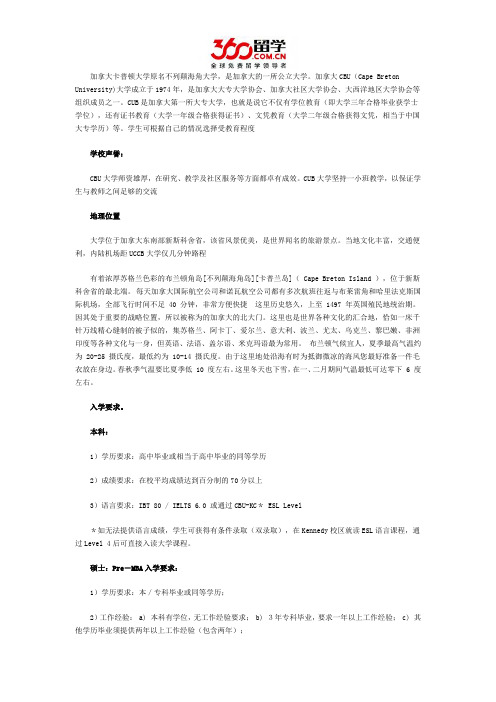
加拿大卡普顿大学原名不列颠海角大学,是加拿大的一所公立大学。
加拿大CBU(Cape Breton University)大学成立于1974年,是加拿大大专大学协会、加拿大社区大学协会、大西洋地区大学协会等组织成员之一。
CUB是加拿大第一所大专大学,也就是说它不仅有学位教育(即大学三年合格毕业获学士学位),还有证书教育(大学一年级合格获得证书)、文凭教育(大学二年级合格获得文凭,相当于中国大专学历)等。
学生可根据自己的情况选择受教育程度学校声誉:CBU大学师资雄厚,在研究、教学及社区服务等方面都卓有成效。
CUB大学坚持一小班教学,以保证学生与教师之间足够的交流地理位置大学位于加拿大东南部新斯科舍省,该省风景优美,是世界闻名的旅游景点。
当地文化丰富,交通便利,内陆机场距UCCB大学仅几分钟路程有着浓厚苏格兰色彩的布兰顿角岛[不列颠海角岛][卡普兰岛]( Cape Breton Island ),位于新斯科舍省的最北端。
每天加拿大国际航空公司和诺瓦航空公司都有多次航班往返与布莱雷角和哈里法克斯国际机场,全部飞行时间不足 40 分钟,非常方便快捷这里历史悠久,上至 1497 年英国殖民地统治期。
因其处于重要的战略位置,所以被称为的加拿大的北大门。
这里也是世界各种文化的汇合地,恰如一床千针万线精心缝制的被子似的,集苏格兰、阿卡丁、爱尔兰、意大利、波兰、尤太、乌克兰、黎巴嫩、非洲印度等各种文化与一身,但英语、法语、盖尔语、米克玛语最为常用。
布兰顿气候宜人,夏季最高气温约为 20-25 摄氏度,最低约为 10-14 摄氏度。
由于这里地处沿海有时为抵御微凉的海风您最好准备一件毛衣放在身边。
春秋季气温要比夏季低 10 度左右。
这里冬天也下雪,在一、二月期间气温最低可达零下 6 度左右。
入学要求。
本科:1)学历要求:高中毕业或相当于高中毕业的同等学历2)成绩要求:在校平均成绩达到百分制的70分以上3)语言要求:IBT 80 / IELTS 6.0 或通过CBU-KC* ESL Level*如无法提供语言成绩,学生可获得有条件录取(双录取),在Kennedy校区就读ESL语言课程,通过Level 4后可直接入读大学课程。
加拿大卡普顿大学优势专业盘点
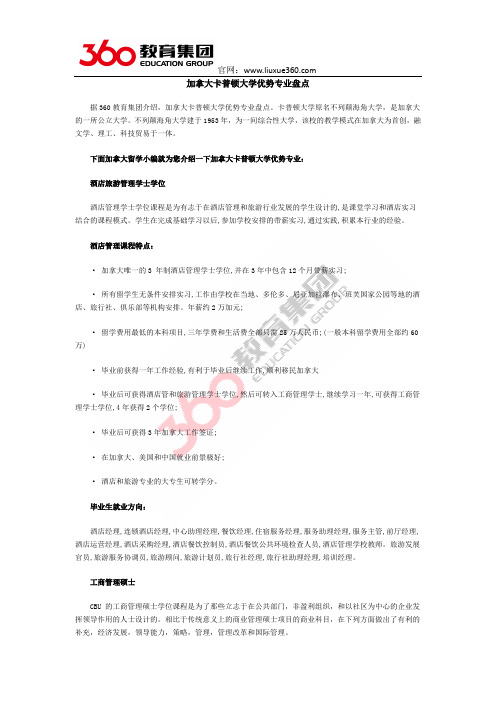
加拿大卡普顿大学优势专业盘点据360教育集团介绍,加拿大卡普顿大学优势专业盘点。
卡普顿大学原名不列颠海角大学,是加拿大的一所公立大学。
不列颠海角大学建于1953年,为一间综合性大学,该校的教学模式在加拿大为首创,融文学、理工、科技贸易于一体。
下面加拿大留学小编就为您介绍一下加拿大卡普顿大学优势专业:酒店旅游管理学士学位酒店管理学士学位课程是为有志于在酒店管理和旅游行业发展的学生设计的,是课堂学习和酒店实习结合的课程模式。
学生在完成基础学习以后,参加学校安排的带薪实习,通过实践,积累本行业的经验。
酒店管理课程特点:·加拿大唯一的3 年制酒店管理学士学位,并在3年中包含12个月带薪实习;·所有留学生无条件安排实习,工作由学校在当地、多伦多、尼亚加拉瀑布、班芙国家公园等地的酒店、旅行社、俱乐部等机构安排。
年薪约2万加元;·留学费用最低的本科项目,三年学费和生活费全部只需25万人民币;(一般本科留学费用全部约60万)·毕业前获得一年工作经验,有利于毕业后继续工作,顺利移民加拿大·毕业后可获得酒店管和旅游管理学士学位,然后可转入工商管理学士,继续学习一年,可获得工商管理学士学位,4年获得2个学位;·毕业后可获得3年加拿大工作签证;·在加拿大、美国和中国就业前景极好;·酒店和旅游专业的大专生可转学分。
毕业生就业方向:酒店经理,连锁酒店经理,中心助理经理,餐饮经理,住宿服务经理,服务助理经理,服务主管,前厅经理,酒店运营经理,酒店采购经理,酒店餐饮控制员,酒店餐饮公共环境检查人员,酒店管理学校教师。
旅游发展官员,旅游服务协调员,旅游顾问,旅游计划员,旅行社经理,旅行社助理经理,培训经理。
工商管理硕士CBU 的工商管理硕士学位课程是为了那些立志于在公共部门,非盈利组织,和以社区为中心的企业发挥领导作用的人士设计的。
相比于传统意义上的商业管理硕士项目的商业科目,在下列方面做出了有利的补充,经济发展,领导能力,策略,管理,管理改革和国际管理。
卡尔顿大学硕士课程专业
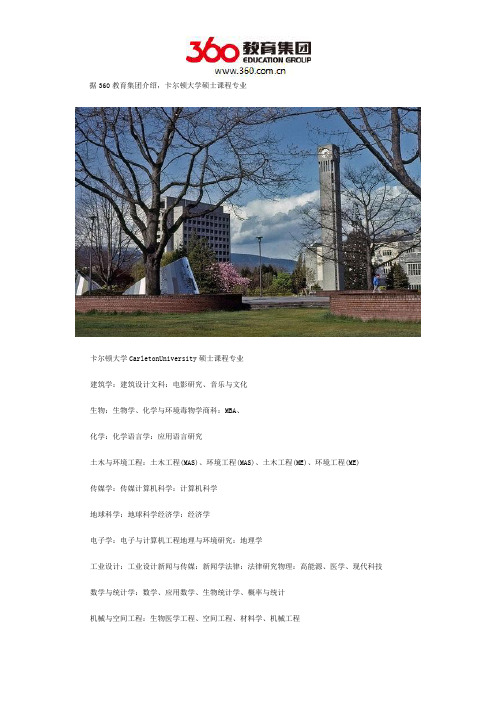
据360教育集团介绍,卡尔顿大学硕士课程专业
卡尔顿大学CarletonUniversity硕士课程专业
建筑学:建筑设计文科:电影研究、音乐与文化
生物:生物学、化学与环境毒物学商科:MBA、
化学:化学语言学:应用语言研究
土木与环境工程:土木工程(MAS)、环境工程(MAS)、土木工程(ME)、环境工程(ME)
传媒学:传媒计算机科学:计算机科学
地球科学:地球科学经济学:经济学
电子学:电子与计算机工程地理与环境研究:地理学
工业设计:工业设计新闻与传媒:新闻学法律:法律研究物理:高能源、医学、现代科技数学与统计学:数学、应用数学、生物统计学、概率与统计
机械与空间工程:生物医学工程、空间工程、材料学、机械工程
心理学:心理学、神经系统科学
公共管理:公共管理社会学与人类学:人类学、社会学、定量方法论
社会工作:社会工作系统与计算机工程:电子与计算机工程、科技与创新管理。
卡尔顿大学的金融硕士

卡尔顿大学的金融硕士课程:卡尔顿大学是一所综合类大学,教学与研究并重,在著名的麦克琳杂志(Maclean‘s Magazine)的大学排行榜上,位于综合类大学第7名卡尔顿大学的研究生课程享誉全球,在研究上的学术声望稳步增长,其国际研究与合作在加拿大大学中排名第一,整体科研质量排名第三。
卡尔顿大学SPROTT商学院提供多样化的课程和服务,MBA课程更是高水准的,许多毕业生任职于世界500强。
2013年,卡尔顿大学SPROTT商学院获得全球顶级商学院AACSB的认证。
专业:MBA-Financial Management 金融管理学制:16个月时间:3月31日前递交申请和材料最低录取要求:IELTS 6.5,单项不低于6,GMAT550+,面试(建议GMAT650分或以上)加拿大金融类硕士专业金融硕士学制通常为一到两年,专业设置在学校的商学院或者管理学院之下,专业主要课程侧重点在金融领域,致力于培养金融方面的人才。
加拿大三类大学(医博类、综合类、基础类)中开设金融硕士专业的院校就多达16所。
工商管理硕士下的金融硕士加拿大大学的工商管理硕士通常会设有不同方向,金融即为其中主要方向之一。
其课程多以金融为主,但也较多地涉及其他商科和管理领域。
此专业通常较为看重申请人的工作经验。
比如西安大略大学、多伦多大学等,也有学校可以不要求工作经验申请,比如卡尔顿大学、布鲁克大学等。
金融工程硕士金融工程是加拿大金融类硕士中专业性最强的一种,这类学科由金融学、数学与工程学互相交叉渗透而形成。
通常对学生的专业背景有一定要求,但这也成为许多其他专业学生(如数学专业、计算机专业等)想要转入金融专业的最佳选择之一。
加拿大金融硕士的就业前景一、纯金融方向——MSF/MFMSF 的毕业生在就业上可选的范围非常广泛,金融,财务,咨询行业都有很多适合的岗位。
包括:企业内部的金融工作:任何有一定规模的企业,都会有一些金融方面的工作。
工作包括公司财务状况的分析,汇总和报告,项目和部门的和企业的财务预算和管理等。
卡尔顿学分政策

卡尔顿学分政策
卡尔顿学院(Carleton College)创建于1866年,位于美国明尼苏达州,是一所小规模、高质量的文理学院。
该学院的学分政策如下:
- 专业选择:学生需选择至少一种主修专业作为自己的主修方向,一般来讲,完成每种主修专业需上满该专业内的至少12门课;而完成辅修专业需上满至少8门课。
另外,学生亦可根据自己的兴趣及导师的建议设计特别的主修专业。
- 学分转换:卡尔顿学院与哥伦比亚大学、华盛顿大学圣路易斯分校都有3+2工程项目,结束后可获得卡尔顿的文学士及对方学校的理学士学位,并且和哥伦比亚大学一起提供3+3的法学JD项目,结束后可获得卡尔顿的文学士和哥伦比亚大学的法律博士学位。
卡尔顿学院致力于提供真正的文科教育,以拓宽学生的学习领域及令其更深入的思考问题。
如需了解更多卡尔顿学院的学分政策信息,可访问其官方网站。
卡尔顿大学计算机硕士专业

卡尔顿大学计算机硕士专业卡尔顿大学坐落在加拿大的首府渥太华,这个城市的人民可以观赏最美丽的雪景,学生们可以玩雪橇,滑雪等有意义的活动。
另外它还有有“郁金香城”之美誉,每年5月份,整个城市都能闻到郁金香的香味,所以也叫“花园城市”。
据360教育集团介绍,卡尔顿大学的计算机专业是这个学校最强的专业之一,计算机专业的研究生院是加拿大最著名的高科技网络公司-北方电讯(NortelNetworks)寻找雇员的首选。
在安大略省所有大学中,卡尔顿大学荣获的3MTeachingAwards数量名列第一。
卡尔顿大学计算机科学专业(computerscience)每年开设讨论课,采用开放式教学,不限定听课的层次,博硕研究生都可参加,而且学分是互认的。
学生选课时采用自助方式,通过学校教务系统在线注册即可。
讨论课没有固定教材,阅读材料全部来自开课教授的校内将讨论主页。
教授一般会提前一周将讨论专题和讨论材料发表在主页上,学生自己下载。
学生在学习的时候很有针对性,完成课程的效率较高。
计算机科学所学的课程有(部分)如下:InterdictiontoComputersfortheArtsandSocialScience介绍人文社会科学院计算机IntroductiontoComputersfortheScience介绍计算机科学ComputeOrganization计算机组织ProgramminginC++C++编程OperatingSystem作业系统Database数据库SoftwareQualityAssurance软件质量保障ArtificialIntelligence人工智能AdvanceComputerDesignAndDevelopment先进电脑设计和开发UserinterfaceArchitecture用户界面架构。
- 1、下载文档前请自行甄别文档内容的完整性,平台不提供额外的编辑、内容补充、找答案等附加服务。
- 2、"仅部分预览"的文档,不可在线预览部分如存在完整性等问题,可反馈申请退款(可完整预览的文档不适用该条件!)。
- 3、如文档侵犯您的权益,请联系客服反馈,我们会尽快为您处理(人工客服工作时间:9:00-18:30)。
留学360介绍,卡尔顿大学建于1942年成立, 1957年正式成为大学,是加拿大著名的公立大学。
卡尔顿大学位于加拿大首都渥太华市中心,校园占地62公顷,风景秀丽,毗邻政府机构,实验室,图书馆,学习氛围浓郁。
它在公共事务与管理、高科技等领域中名列前茅,享有盛誉。
是安大略湖大学联盟的成员,也是国际大学联合会的成员。
大学位于加拿大首都渥太华市中心,校园占地62公顷,风景秀丽,毗邻政府机构,实验室,图书馆和使馆区,学习氛围浓郁。
渥太华有人口一百多万,也是高技术企业密集区。
它环境优美、整洁、安全,充满活力,拥有许多世界级的博物馆和艺术馆,是著名的国际会议和旅游、体育运动的圣地,每年举行60多种节庆活动,是一个多语言的国际都市,英语和法语并用。
渥太华国际机场位于渥太华市中心南10公里处,开通往返于多伦多、温哥华和蒙特里尔等加拿大各大城市及中国、美国等国际城市的航班,且班次较多,如到多伦多的航班每小时有1-2班。
从渥太华国际机场到达市区可乘坐机场大巴,机场大巴每半小时一班,可到达市内各大酒店。
从渥太华可通过铁路快速到达加拿大各大城市
入学时间
1 , 5 , 7 , 9 月,但只有冬季与秋季开设所有课程。
入学的基本条件:
1) 国内高中以上学历,并且平均成绩在80分以上
文科需达 67%-80% ,商科 74%-80% ,工程 70%-85%
2) *老托福即Paper-based TOEFL (PBT) 580分(机考237分以上)
*新托福Internet-based TOEFL (IBT) 86分(且写作,口语单项至少22;阅读,听力至少20)
*IELTS 6.5分上,且听,说,读,写各不能低于6.0
加拿大卡尔顿大学又译名“加拿大加尔登大学”,于1957年正式成为大学,坐落在加拿大首都渥太华市,是加拿大著名的公立大学之一。
卡尔顿大学专业设置广泛,拥有包括各领域的65种课程,在经济学,公共事务管理,高科技等领域尤为突出。
学校的新闻学院被公认是加拿大最好的,可以给学生提供很多实践机会,到国内各媒体如当地电台、电视台实习等。
文科:人类学、经济、环境研究、电影研究、地理、历史、法律、语言学及实用语言研究、大众传媒、音乐、哲学、宗教、女性研究
商科:财会、商业经营分析、金融及信息系统、国际商务、市场营销、人力资源、管理、经营管理
计算机:管理及商务系统、网络计算机、软件及计算机、软件工程
工类:航空工程、通讯工程、计算机系统工程、电子工程、环境工程、机械工程
数学:计算机数学、计算机统计、数学、统计
卡尔顿大学硕士课程专业
建筑学:建筑设计文科:电影研究、音乐与文化
生物:生物学、化学与环境毒物学商科:MBA、
化学:化学语言学:应用语言研究
土木与环境工程:土木工程、环境工程、土木工程、环境工程
传媒学:传媒计算机科学:计算机科学
地球科学:地球科学经济学:经济学
电子学:电子与计算机工程地理与环境研究:地理学
工业设计:工业设计新闻与传媒:新闻学
法律:法律研究物理:高能源、医学、现代科技
数学与统计学:数学、应用数学、生物统计学、概率与统计
机械与空间工程:生物医学工程、空间工程、材料学、机械工程
心理学:心理学、神经系统科学
公共管理:公共管理社会学与人类学:人类学、社会学、定量方法论
社会工作:社会工作系统与计算机工程:电子与计算机工程、科技与创新管理。
